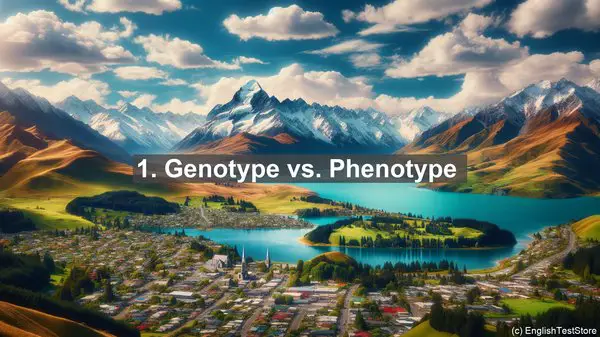Introduction
Welcome to today’s lesson. In the world of crop biotechnology, there are several terms that often get mixed up. In this lesson, we’ll be exploring the top 10 commonly confused words in this field. So, let’s dive right in!
1. Genotype vs. Phenotype
One of the fundamental distinctions in crop biotechnology is between genotype and phenotype. Genotype refers to the genetic makeup of an organism, while phenotype is the observable characteristics resulting from that genetic makeup. Understanding this difference is crucial for various applications, such as breeding programs or genetic engineering.
2. Transgenic vs. Genetically Modified
These two terms are often used interchangeably, but they have distinct meanings. Transgenic refers to the transfer of genes from one organism to another, regardless of the method used. On the other hand, genetically modified encompasses a broader range of techniques, including gene editing or mutagenesis. So, while all transgenic organisms are genetically modified, the reverse is not always true.
3. Hybrid vs. Genetically Modified
Hybridization is a traditional breeding technique that involves crossing two different but closely related plants to obtain desirable traits. Genetically modified, as we discussed earlier, encompasses a broader range of techniques. While both approaches aim to improve crop characteristics, they differ in terms of the underlying method and the extent of genetic alteration.
4. Herbicide vs. Pesticide
These terms often cause confusion, but they refer to different types of crop protection. Herbicides specifically target and control unwanted plants or weeds. Pesticides, on the other hand, is a broader term that encompasses substances used to control various pests, including insects, fungi, or bacteria. So, while all herbicides are pesticides, not all pesticides are herbicides.
5. Biotechnology vs. Genetic Engineering
Biotechnology is a broad field that encompasses various techniques and applications involving living organisms or their components. Genetic engineering, on the other hand, specifically refers to the manipulation of an organism’s genetic material to achieve a desired outcome. In crop biotechnology, genetic engineering is often a key tool, but it’s just one aspect of the broader field.
6. GMO vs. Non-GMO
GMO, or genetically modified organism, is a term that often sparks debates. It refers to any organism whose genetic material has been altered through genetic engineering. Non-GMO, as the name suggests, refers to organisms that have not undergone such genetic modifications. It’s important to note that while GMOs have their advantages and disadvantages, the term ‘non-GMO’ doesn’t necessarily imply superiority or safety.
7. Biofortification vs. Fortification
Both these terms relate to enhancing the nutritional value of crops, but they differ in their approach. Fortification involves adding specific nutrients to a food product, often during processing. Biofortification, on the other hand, aims to naturally increase the nutrient content of crops through breeding or genetic engineering. Both approaches play a crucial role in addressing nutritional deficiencies.
8. Resistance vs. Tolerance
When it comes to crop protection, these two terms are often used. Resistance refers to a plant’s ability to withstand or repel a pest or disease, often due to specific genetic traits. Tolerance, on the other hand, refers to a plant’s ability to endure or recover from a stressor, such as drought or extreme temperatures. Both traits are important for crop resilience and productivity.

9. Insecticide vs. Insect-resistant
Insecticides are substances specifically designed to control or eliminate insects. In contrast, the term ‘insect-resistant’ refers to plants that have been genetically modified to possess traits that make them less susceptible to insect damage. While insecticides can be effective, insect-resistant crops offer a more sustainable and targeted approach to pest management.

10. Yield vs. Productivity
These terms are often used interchangeably, but they have subtle differences. Yield refers to the amount of crop produced per unit area, often measured in weight or volume. Productivity, on the other hand, is a broader concept that encompasses not just the quantity but also the efficiency and sustainability of crop production. Maximizing both yield and productivity is crucial for global food security.
